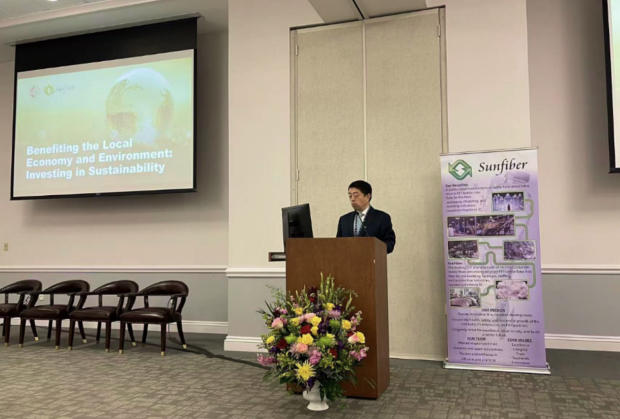Environmental Commitments
BOC U.S.A. continues to make improvements to its green financial governance structure, strengthening its systems, policies and procedures, as well as its ESG risk management mechanisms to promote green development.
BOC U.S.A. continues to deliver products and services while implementing new practices to work twoard a greener future. Standing behind the commitment at the BOC Group level to facilitate a low-carbon transition using green financial services, BOC U.S.A. too is an active participant in global climate governance, has expanded our capacity for green finance, and continues to form strategic partnerships with key stakeholders to promote ecological harmony and biodiversity.
Business Development of Green Finance
The BOC Group, representing headquarters and all international branches, announced the inclusion of green finance as one of our key development focuses over a five-year period from 2021 to 2025.
BOC U.S.A. has played a contributing role in the BOC Group’s green finance globalization efforts by developing environmentally friendly financial products and services to meet market needs. BOC U.S.A.’s green finance initiatives focus on financial services in the fields of:
- Environmental protection
- Energy conservation
- Clean energy
- Green transportation
- Green buildings

Green Finance Strategic Plan
The BOC Group also developed a Green Finance Strategic Plan to provide guidance in terms of resource allocation, risk management, and market pricing for all BOC branches and affiliates, including BOC U.S.A., to accelerate the transformation toward a greener and lower-carbon future.
Initiatives
include:
In 2023, BOC U.S.A. issued $500 million of green bonds, providing a sustainable and environmentally friendly source of liquidity for clients. These green bond proceeds focused on projects related to renewable energy, pollution prevention, and green buildings, which are designed to meet the specific funding requirements of global and national financial institutions. The bonds, issued pursuant to a Reg S offering under BOC’s Medium Term Note Program (MTN), mark the largest green bond issuance by a Chinese financial institution in the Americas.
Between 2021-2022, BOC U.S.A. successfully completed more than 12 ESG-related large-scale green finance projects. One of these was the financing of Vineyard Wind, the largest commercial offshore wind power project in the United States. Project Finance International awarded this deal their “2021 Global Best Environmental, Social, and Corporate Governance Project.”
In 2022, BOC U.S.A. participated in the refinancing syndicated project of loans for Venture Global, Duke Energy, Geysers Power Company's large-scale geothermal power station, and Solar Partner. BOC U.S.A. also participated in Waste Management’s syndicated loan for improved recycling efforts.
In 2021, BOC U.S.A.’s New York branch issued a green standby letter of credit for aiding cooperation between General Electric and Sinohydro Corporation Limited on water conservancy equipment trading.
Did you know? BOC U.S.A. was the first Chinese bank in the U.S. to issue a public offshore RMB green bond, which was also the largest offshore RMB bond by any global Chinese bank at that time. The issuance was awarded the “2016 Global Capital: Asia Pacific Green/SRI Bond Deal of the Year” by Global Capital, the “2016 The Asset Triple A Country Awards: Best FIG Green Bond” by the Assets, and the “2016 IFR Asia Regional Awards: SRI Bond” by International Financing Review. Ernst & Young gave the issuance a “deep green (GB-AAA)” independent third-party rating.
Green Lending
As a standard practice, BOC U.S.A. considers climate change and social impact when making lending decisions. We conduct our credit business in a responsible manner to enhance the development of cleaner energy sources:

“ESG in Infrastructure & Transportation” event with BOC U.S.A. CEO & President
BOC U.S.A. organized and participated in a range of environment-related exchange events to express its views on and insights around green finance. The event included a panel discussion entitled "ESG in Infrastructure and Transportation" in June 2023 to highlight the critical application that ESG principles play in these two important sectors. The event attracted attendees from various industries and fostered meaningful discussions and debates.
As economic principles evolve and new paradigms emerge, BOC U.S.A. continues to embrace the opportunities that ESG efforts create to address global community challenges. With the support of industry-leading experts and our close monitoring of the environmental and social impacts on infrastructure and transportation projects, BOC U.S.A. continues to enhance our efforts to ensure that we are investing in initiatives that advocate for safe, clean, and equitable systems.
On May 6, 2022, BOC U.S.A. CEO & President Hu was invited to present at the China General Chamber of Commerce –USA’s Sustainable Development Forum.
In his speech, he introduced the significance of ESG to sustainable development in the banking industry and the various achievements our bank has carried out on the ESG front.

Climate Risk Management
BOC Group formulated the Policy for Managing the Environmental (Climate), Social and Governance Risks of Customers, which was considered and approved by the Green Finance Committee chaired by the Chief Risk Officer, to strengthen the management of the whole process of credit and investment.
BOC U.S.A. has embedded climate considerations into our strategic risk tools to help guide our decision-making. We incorporate climate risk as a transverse risk, or risk driver, that affects all risk types. We assess the potential impact of climate change on different asset classes within our portfolio, based on factors such as sectors, location of physical assets and operations, management policies, firm financial characteristics, and ways credit profiles could be impacted by climate change. We will conduct preliminary research on climate risk stress testing by evaluating scenarios of climate risk and approaches to conducting climate risk stress testing. The Bank has completed a questionnaire from the Office of the Comptroller of the Currency (OCC) covering climate risk management framework and policy and procedures, and is responsive to the changing needs and demands of our stakeholders.
Climate risks are divided into two categories at BOC: Physical Risk and Transition Risk. Physical Risks comprise those that are material to a customer’s business operation and asset value, specifically when it comes to aspects affected directly by climate change, which takes the form of severe weather, loss of ecosystem, natural disasters, etc. Transition Risks are those factors that are impacted during the customer’s process of transitioning to be more climate resilient and to meet the evolving challenges caused by climate change. These include changes in policy, technological advancements, consumer preferences, and the like.

Operational Footprint
We are also committed to fostering an environmentally friendly workplace in our offices and equipping our employees with tools and opportunities to be green champions. We do this through:

